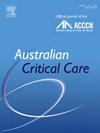重症监护临床医生对whānau参与新西兰奥特罗阿成人重症监护床边查房的态度和看法:一项在线调查。
IF 2.6
3区 医学
Q2 CRITICAL CARE MEDICINE
引用次数: 0
摘要
背景:临床实践指南支持家庭参与查房,以改善患者、whānau(家庭)和医疗团队之间的沟通和参与,但这种做法尚未普遍实施。Whānau纳入成人床边查房往往遇到犹豫的重症监护病房(ICU)医疗保健临床医生,其原因尚未探讨在奥特罗阿,新西兰。目的:本研究的目的是评估新西兰Aotearoa ICU临床医生对whānau-family纳入成人ICU查房的态度和看法。方法:在2020年7月至12月期间,采用自我管理的在线问卷,对新西兰奥特罗阿的三个大都市icu以及新西兰重症监护护士学院和澳大利亚和新西兰重症监护医学学院的成员进行全国性、前瞻性、横断面调查。结果:共有188名ICU医生、护士和专职卫生专业人员回应。超过一半的受访者强烈(23.4%)或有些同意(29.3%)whānau-family会员应该有参加床边查房的选择,而超过一半的受访者表示,当whānau-family在查房时,他们有积极的体验。经验不足的护士比经验丰富的护士更有可能在查房时要求whānau-family离开(分别为46.5%对38.2%,p = 0.006)。临床医生表示担心whānau-family的加入会延长查房时间,减少教学机会,限制敏感信息的讨论,并危及患者的隐私。然而,他们也表示,whānau-family-centred回合有助于更好地向whānau-family成员提供信息,并促进文化安全实践。结论:重症监护临床医生对whānau-family-centred查房表现出积极的态度和看法,但对查房的结构和质量提出了担忧。临床医生认识到whānau-family-centred查房是加强沟通和促进文化安全实践的机会。需要就whānau-family-centred回合的好处进行教育,以促进执行。本文章由计算机程序翻译,如有差异,请以英文原文为准。
Intensive care clinician attitudes and perceptions towards whānau participation in adult intensive care bedside ward rounds in Aotearoa New Zealand: An online survey
Background
Clinical practice guidelines endorse family involvement in ward rounds to improve communication and engagement between patients, whānau (family), and healthcare teams, yet the practice has not been universally implemented. Whānau inclusion in adult bedside rounds is often met with hesitation by intensive care unit (ICU) healthcare clinicians, and reasons for this have not been explored in Aotearoa, New Zealand.
Objectives
The aim of this study was to assess attitudes and perceptions of ICU clinicians towards whānau-family inclusion in adult ICU ward rounds in Aotearoa New Zealand.
Methods
A national, prospective, cross-sectional survey using a self-administered online questionnaire was distributed to three metropolitan ICUs in Aotearoa, New Zealand, and members of the New Zealand College of Critical Care Nurses and the College of Intensive Care Medicine of Australia and New Zealand in the period July–December 2020.
Results
In total, 188 ICU physicians, nurses, and allied health professionals responded. Over half of respondents strongly (23.4%) or somewhat agreed (29.3%) that whānau-family members should be given the option to attend bedside rounds, whereas more than half reported having had a positive experience when whānau-family had been present on rounds. Less experienced nurses were more likely to ask whānau-family to leave during rounds than more experienced nurses (46.5% vs 38.2%, respectively, p = 0.006). Clinicians voiced concern that whānau-family inclusion would prolong rounds, reduce teaching opportunities, constrain discussion of sensitive information, and compromise patient confidentiality. However, they also said that whānau-family-centred rounds were useful to better inform whānau-family members and to facilitate culturally safe practice.
Conclusion
Intensive care clinicians demonstrated positive attitudes and perceptions towards whānau-family-centred ward rounds, but concerns regarding the structure and quality of rounds were raised. Clinicians recognise whānau-family-centred rounds as an opportunity to enhance communication and facilitate culturally safe practice. Education regarding the benefits of whānau-family-centred rounds to facilitate implementation is required.
求助全文
通过发布文献求助,成功后即可免费获取论文全文。
去求助
来源期刊

Australian Critical Care
NURSING-NURSING
CiteScore
4.90
自引率
9.10%
发文量
148
审稿时长
>12 weeks
期刊介绍:
Australian Critical Care is the official journal of the Australian College of Critical Care Nurses (ACCCN). It is a bi-monthly peer-reviewed journal, providing clinically relevant research, reviews and articles of interest to the critical care community. Australian Critical Care publishes peer-reviewed scholarly papers that report research findings, research-based reviews, discussion papers and commentaries which are of interest to an international readership of critical care practitioners, educators, administrators and researchers. Interprofessional articles are welcomed.
 求助内容:
求助内容: 应助结果提醒方式:
应助结果提醒方式:


